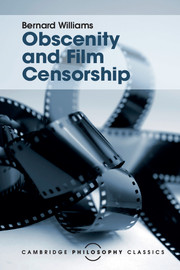6 - Harms?
from Part 2 - Principles
Published online by Cambridge University Press: 05 November 2015
Summary
Effects On Sex Crimes And Violence
6.1 We start our review of the harms possibly caused by pornography and violent material with the area where the harms alleged are of the most definitely identifiable kind, and where it is suggested that the effects of the material are kinds of behaviour which tend to be noticed particularly because they conflict with the law.
6.2 The arguments here are that certain kinds of behaviour, particularly in the form of criminal offences of violence and of a sexual nature, are either directly provoked by exposure to particular stimuli—such as the reading of a sex magazine producing a state of arousal which is manifested in rape or sexual assault, or the viewing of a film producing imitative violence—or are at least more likely to occur in an atmosphere created by pornography and violent material. The arguments suggest, therefore, that the proliferation of pornography results in increasing sexual offences and that violence in the media leads to an increase in offences of violence.
6.3 Submissions made to us on this subject, where they considered it necessary to support simple assertions by some kind of evidence, rested on three different classes of information. One kind may be called (without disrespect) “anecdotal”, and is drawn from particular instances in which an association between crime and pornographic material has been observed, and a causal connection, it is claimed, can plausibly be supposed. We consider in this context also considerations put to us by psychiatrists on the basis of clinical experience. A second kind of evidence is drawn from research, involving experiments or guided observations, into human responses to particular kinds of material. Such research, obviously enough, does not itself involve the subjects committing crimes (or at least none that does has been drawn to our attention). What it rather does is to enquire whether reactions in the experimental set-up are of a kind—for instance, of an aggressive kind—which would lead one to expect crime or other anti-social behaviour as a response to that material in ordinary life. The third kind of evidence—the kind that has commanded a great deal of attention and aroused a great deal of controversy in this subject—is that drawn from statistical analysis of trends in known crime relative to the varying availability of pornography.
- Type
- Chapter
- Information
- Obscenity and Film CensorshipAn Abridgement of the Williams Report, pp. 83 - 125Publisher: Cambridge University PressPrint publication year: 2015

